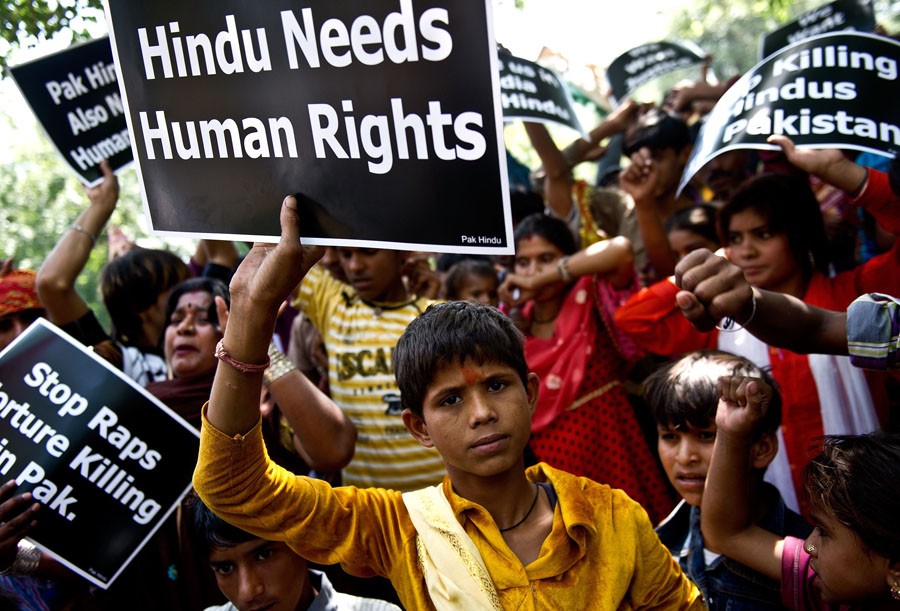
The Sindh Assembly unanimously passes a law against forced conversion

Ayub Khan Sirhindi owns a Khanqah in Umerkot. The Sunni leader who belongs to the Naqshbandi silsila provides refuge to couples who elope and embrace Islam.
He claims to go by the book. "When a couple wants to embrace Islam we take them to the court. The court calls their parents and they confess to changing their faith. There is no coercion," says Ayub Khan, speaking to The News on Sunday over the phone from Umerkot.
Like many other religious leaders, Khan rejects the Sindh Criminal (Protection of Minorities) Bill 2015 that was passed unanimously in the Sindh Assembly this month.
The bill makes forced conversion of minorities a punishable offence. It recommends a five year prison sentence to offenders. Additionally it gives all new converts 21 days to reconsider their decision. Moreover, it sets an age limit of 18 years for conversion.
The bill was proposed by Nand Kumar Golkani who cited several examples from rural Sindh including Umerkot and Jacobabad where forced conversions were taking place.
One of the cases he quoted, according to local media reports, was of Anjali Kumar Meghwar. In the 2014 case, Anjali’s parents held several protests, claiming that their 12-year-old daughter was kidnapped from their house in Daharki and then forcibly converted.
Anjali is currently in a shelter home in Karachi as the case is still being heard in the Sindh High Court. On November 17, 2015 during a court hearing by a division bench presided by Justice Sajjad Ali Shah, Anjali said she wanted to go with her husband. As there was confusion over her exact age the court sent her to a women’s shelter.
Forced conversion has long been an issue in Pakistan but it got its due share of hype with the 2012 case of an upper class Hindu girl Rinkle Kumari who her family alleged had been kidnapped and forced to convert to Islam. Her case made it to the Supreme Court where in front of a bench Rinkle chose to go with her husband.
Another person who gained notoriety in 2012 was Mian Mitho, a Pir and Pakistan People’s Party parliamentarian, who allegedly kidnapped Hindu girls and forced them to marry their kidnappers.
Amarnath Motumal, a leader of the Hindu community and representative of the Human Rights Commission of Pakistan, said that he welcomes the bill with open arms. "It’s just the first step. But when a law is passed, it becomes easier to tackle instances of religious extremism."
There is no data of the number of forced conversion in the province as most cases go unreported. He said that a specific group of people encourages kidnapping of Hindu girls and forcibly converts them to Islam.
He said that most cases of forced conversions occurred in poor neighbourhoods of Karachi including Lyari’s Baghdadi area, Ranchorline and Tharparkar.
Aurat Foundation’s Director Mahnaz Rahman who was involved in tabling the bill, said, "The way there is an age limit for issuing a driving licence, there should be an age limit for converting one’s faith."
"One should not see cases of forced conversion one-sidedly. In many cases the girls convert to Islam of their own will. Since Muslims are in majority there are cases when Hindu girls fall in love and elope. In such cases their families protest that their daughters have been forcibly converted," she said.
Meanwhile, religious parties across the country have registered strong protest over the passing of this bill. Maulana Sami-ul-Haq of Jamiat Ulema-e-Islam (Sami ul Haq) has called for the dissolution of the Sindh Assembly and governor rule in Sindh over the passage of this "unIslamic" bill.
The Jamaat-e-islami has alleged that the PPP government passed this bill to divert attention of the public from more important issues. The JI general secretary Liaquat Baloch has said that they will challenge the bill in the Council for Islamic Ideology (CII).
Jamiat Ulema-e-Islam (Fazal) Karachi leader Qari Usman said, "There is no age for conversion to Islam. Hazrat Ali (RA) was only a child when he embraced Islam," he says.
Ayub Khan claims that the activities of Christian missionaries who give incentives like education and employment to low caste Hindus for conversion to their faith go unnoticed. "The media, both local and international, reports only when someone embraces Islam."